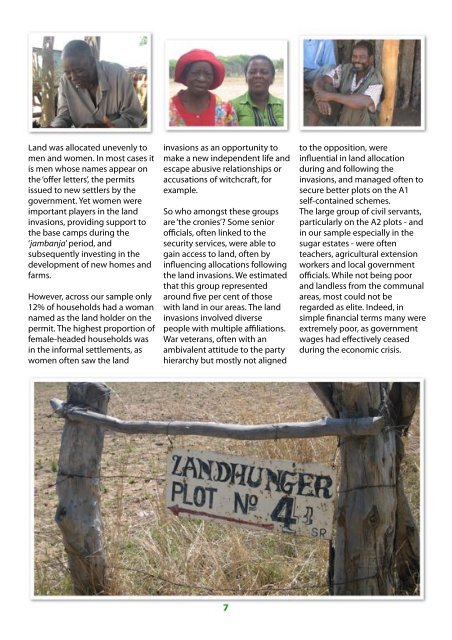Zimbabwe's Land Reform
Zimbabwe's Land Reform
Zimbabwe's Land Reform
Create successful ePaper yourself
Turn your PDF publications into a flip-book with our unique Google optimized e-Paper software.
<strong>Land</strong> was allocated unevenly to<br />
men and women. In most cases it<br />
is men whose names appear on<br />
the ‘offer letters’, the permits<br />
issued to new settlers by the<br />
government. Yet women were<br />
important players in the land<br />
invasions, providing support to<br />
the base camps during the<br />
‘jambanja’ period, and<br />
subsequently investing in the<br />
development of new homes and<br />
farms.<br />
However, across our sample only<br />
12% of households had a woman<br />
named as the land holder on the<br />
permit. The highest proportion of<br />
female-headed households was<br />
in the informal settlements, as<br />
women often saw the land<br />
invasions as an opportunity to<br />
make a new independent life and<br />
escape abusive relationships or<br />
accusations of witchcraft, for<br />
example.<br />
So who amongst these groups<br />
are ‘the cronies’? Some senior<br />
officials, often linked to the<br />
security services, were able to<br />
gain access to land, often by<br />
influencing allocations following<br />
the land invasions. We estimated<br />
that this group represented<br />
around five per cent of those<br />
with land in our areas. The land<br />
invasions involved diverse<br />
people with multiple affiliations.<br />
War veterans, often with an<br />
ambivalent attitude to the party<br />
hierarchy but mostly not aligned<br />
to the opposition, were<br />
influential in land allocation<br />
during and following the<br />
invasions, and managed often to<br />
secure better plots on the A1<br />
self-contained schemes.<br />
The large group of civil servants,<br />
particularly on the A2 plots - and<br />
in our sample especially in the<br />
sugar estates - were often<br />
teachers, agricultural extension<br />
workers and local government<br />
officials. While not being poor<br />
and landless from the communal<br />
areas, most could not be<br />
regarded as elite. Indeed, in<br />
simple financial terms many were<br />
extremely poor, as government<br />
wages had effectively ceased<br />
during the economic crisis.<br />
7

















